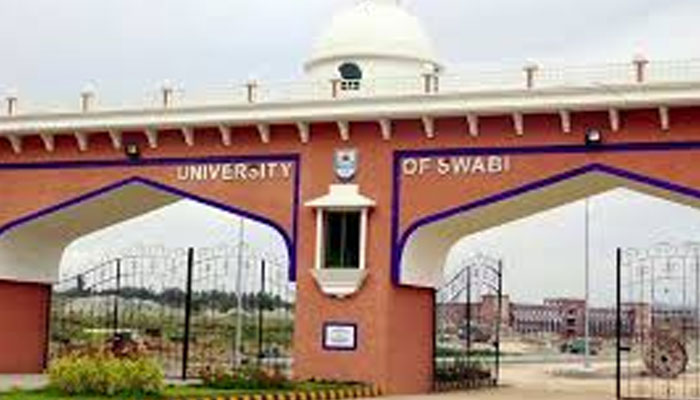University of Swabi seminar: Speakers note new developments augur well for peace in region
SWABI: The two-day international conference on Afghanistan concluded here Thursday at the University of Swabi with the common observation that recent developments including the exchange of prisoners augured well for restoration of peace in the war-ravaged country.
The seminar titled “Historical Perspectives, Current Scenarios and Future Prospects” was organized by the Political Science department of the university.
The invitees included former ambassador Ali Reza Bedeki, now a senior researcher associated with Institute for Political and International Studies, Tehran, and Consul General in Peshawar, Muhammad Bagher Beigi. They both spoke at the seminar and explained Iran’s policy for ending the Afghan conflict and stabilizing Afghanistan.
Two scholars from Afghanistan were also invited, but they didn’t come. A number of scholars from other parts of Pakistan also came to Swabi to speak at the seminar.
The faculty members and students of University of Swabi showed keen interest in the seminar as the hall overflowed due to the high number of participants and many had to stand throughout the proceedings.
The university’s Vice-Chancellor Dr Imtiaz Ali Khan welcomed the guests and remained present throughout at the seminar.
On the second day of the seminar on Thursday, the speakers included retired Major Mohammad Aamir, a former advisor to KP chief minister, senior journalists Rahimullah Yusufzai and Saleem Safi, Prof Dr Abdur Rauf who is chairman of the Political Science department at the University of Peshawar, and Prof Dr Jehanzeb Khalil, a former Dean of Social Sciences, Abdul Wali Khan University presently associated with the Benazir Bhutto Shaheed Women University, Peshawar.
Major Aamir said that since the establishment of Afghanistan, numerous political games had been played on Afghan soil by the world powers and the foreign meddling in Afghan affairs had not been stopped due to different reasons and interests.
Rahimullah Yusufzai said that certain new developments in Afghanistan, including the Taliban-US peace talks, the intra-Afghan meetings and the exchange of prisoners under a deal between the Taliban, US and the Afghan government had raised hopes after four decades of war that peace is achievable. He said the revival of the peace talks between the Taliban and the US was likely while the intra-Afghan meetings ought to continue to bring together the Taliban, the Afghan government and the political opposition groups in Afghanistan to resolve the issues and devise a roadmap of peace and stability for the country.
However, he noted that making predictions about Afghanistan could be hazardous owing to the past record of failed peace talks and on-implementation of agreements that were reached. Saleem Safi said that peace among numerous Afghan factions was more vital than peace agreement with the US.
Dr Rauf said that the regional solution to the Afghan imbroglio would be the only viable option which would boost the trade interaction and economic connectivity. Dr Faraz, head of the Political Science department of the University of Swat, said that the gathering of scholars and diplomats was a unique opportunity to exchange views about the present situation in Afghanistan and exploring solution of the conflict through peaceful means.
-
 Heavy Snowfall Disrupts Operations At Germany's Largest Airport
Heavy Snowfall Disrupts Operations At Germany's Largest Airport -
 Andrew Mountbatten Windsor Released Hours After Police Arrest
Andrew Mountbatten Windsor Released Hours After Police Arrest -
 Heidi Klum Eyes Spooky Season Anthem With Diplo After Being Dubbed 'Queen Of Halloween'
Heidi Klum Eyes Spooky Season Anthem With Diplo After Being Dubbed 'Queen Of Halloween' -
 King Charles Is In ‘unchartered Waters’ As Andrew Takes Family Down
King Charles Is In ‘unchartered Waters’ As Andrew Takes Family Down -
 Why Prince Harry, Meghan 'immensely' Feel 'relieved' Amid Andrew's Arrest?
Why Prince Harry, Meghan 'immensely' Feel 'relieved' Amid Andrew's Arrest? -
 Jennifer Aniston’s Boyfriend Jim Curtis Hints At Tensions At Home, Reveals Rules To Survive Fights
Jennifer Aniston’s Boyfriend Jim Curtis Hints At Tensions At Home, Reveals Rules To Survive Fights -
 Shamed Andrew ‘dismissive’ Act Towards Royal Butler Exposed
Shamed Andrew ‘dismissive’ Act Towards Royal Butler Exposed -
 Hailey Bieber Shares How She Protects Her Mental Health While Facing Endless Criticism
Hailey Bieber Shares How She Protects Her Mental Health While Facing Endless Criticism -
 Queen Elizabeth II Saw ‘qualities Of Future Queen’ In Kate Middleton
Queen Elizabeth II Saw ‘qualities Of Future Queen’ In Kate Middleton -
 Amanda Seyfried Shares Hilarious Reaction To Discovering Second Job On 'Housemaid': 'Didn’t Sign Up For That'
Amanda Seyfried Shares Hilarious Reaction To Discovering Second Job On 'Housemaid': 'Didn’t Sign Up For That' -
 Hilary Duff Reveals Deep Fear About Matthew Koma Marriage
Hilary Duff Reveals Deep Fear About Matthew Koma Marriage -
 Will Sarah Ferguson End Up In Police Questioning After Andrew’s Arrest? Barrister Answers
Will Sarah Ferguson End Up In Police Questioning After Andrew’s Arrest? Barrister Answers -
 Matthew McConaughey Gets Candid About AI Threat To Actors: 'Be Prepared'
Matthew McConaughey Gets Candid About AI Threat To Actors: 'Be Prepared' -
 Hailey Bieber Shares How 16-month-old Son Jack Blues Is Already Following In Justin Bieber's Footsteps
Hailey Bieber Shares How 16-month-old Son Jack Blues Is Already Following In Justin Bieber's Footsteps -
 Zuckerberg Denies At LA Trial That 'Instagram Targets Kids' Amid Addiction Claims
Zuckerberg Denies At LA Trial That 'Instagram Targets Kids' Amid Addiction Claims -
 France Sees Record 102mn International Tourists In 2025
France Sees Record 102mn International Tourists In 2025




